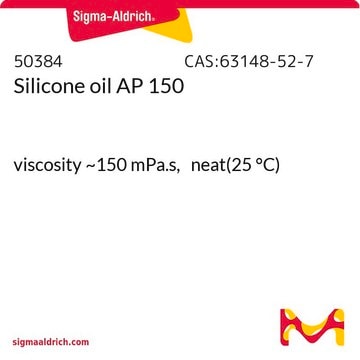317667
Silicone oil
viscosity 5 cSt (25 °C)
Synonym(s):
PDMS, Polydimethylsiloxane
Sign Into View Organizational & Contract Pricing
All Photos(1)
About This Item
Linear Formula:
[-Si(CH3)2O-]n
CAS Number:
MDL number:
UNSPSC Code:
12162002
NACRES:
NA.23
Recommended Products
vapor density
>1 (vs air)
Quality Level
vapor pressure
<5 mmHg ( 25 °C)
5 mmHg ( 20 °C)
form
liquid
refractive index
n20/D 1.403 (lit.)
viscosity
5 cSt(25 °C)
bp
>140 °C/0.002 mmHg (lit.)
density
0.913 g/mL at 25 °C
Looking for similar products? Visit Product Comparison Guide
General description
Silicone oil is low viscosity liquid polymerized siloxanes with organic side chains.
Application
Low viscosity silicone oil has been used to prepare cellulose based electrorheological particles for medical devices. The diffusive behavior of spreading of a silicone oil polymer on solid surfaces was studied. It was also used to investigate Marangoni flow, induced by two liquid droplets on a solid surface, exposed in air. Many diverse applications of silicone oil are as heat exchangers, hydrophobic coating of glass, ceramics, textiles and leathers, component of salves.
Storage Class Code
10 - Combustible liquids
WGK
WGK 1
Flash Point(F)
>214.0 °F - closed cup
Flash Point(C)
> 101.1 °C - closed cup
Personal Protective Equipment
dust mask type N95 (US), Eyeshields, Gloves
Choose from one of the most recent versions:
Certificates of Analysis (COA)
Lot/Batch Number
Don't see the Right Version?
If you require a particular version, you can look up a specific certificate by the Lot or Batch number.
Already Own This Product?
Find documentation for the products that you have recently purchased in the Document Library.
Customers Also Viewed
Dielectric Analysis of Response Time in Electrorheological Fluids Developed for Medical Devices
American Journal of Analytical Chemistry, 2(2), 85-85 (2011)
Pawlenko S
Organosilicon Chemistry null
Diffusive two-dimensional spreading of a polymer
Albrecht U, et al.
Surface Science, 283(1), 383-386 (1993)
Peter Nirmalraj et al.
Scientific reports, 8(1), 10763-10763 (2018-07-19)
Surface contamination and the formation of water bridge at the nanoscopic contact between an atomic force microscope tip and cell surface limits the maximum achievable spatial resolution on cells under ambient conditions. Structural information from fixed intestinal epithelial cell membrane
Chasing drops: following escaper and pursuer drop couple system
Bahadur P, et al.
Journal of Colloid and Interface Science, 332(2), 455-460 null
Our team of scientists has experience in all areas of research including Life Science, Material Science, Chemical Synthesis, Chromatography, Analytical and many others.
Contact Technical Service




